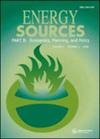Import product diversification and renewable energy: a new appraisal from developed and developing countries
IF 2.2
4区 工程技术
Q3 ENERGY & FUELS
Energy Sources Part B-Economics Planning and Policy
Pub Date : 2022-04-09
DOI:10.1080/15567249.2022.2038733
引用次数: 7
Abstract
ABSTRACT This study investigates the role of the import diversification in the renewable energy consumption for a global panel of both developing and developed economies. The study applies panel co-integration and panel quantile regression analysis on the panel data of 138 countries during 1995–2018. For empirical analysis, the authors used Pedroni) cointegration test and panel-quantile regressions. The investigation proves that the import diversification significantly reduces the renewable energy consumption and there is a major need for designing and implementing some revised and synchronized policies of trade with the energy mix and sustainable development goals. The empirical findings claim that the foreign direct investments, natural resources and GDP increase significantly boost the renewable energy demand for both groups of developing and developed countries. Therefore, this study shows that generally the current trade policies might be ineffective and import diversification policies should be reformed to match with the energy regulations, manufacturing, and sustainable development goals.进口产品多样化与可再生能源:发达国家与发展中国家的新评价
摘要本研究以发展中国家和发达国家为研究对象,探讨了进口多样化在可再生能源消费中的作用。本研究对1995-2018年138个国家的面板数据进行了面板协整和面板分位数回归分析。实证分析采用Pedroni协整检验和面板分位数回归。调查证明,进口多样化大大降低了可再生能源的消耗,有必要设计和实施一些与能源结构和可持续发展目标同步的修订贸易政策。实证结果表明,外国直接投资、自然资源和国内生产总值的增加显著促进了发展中国家和发达国家对可再生能源的需求。因此,本研究表明,目前的贸易政策总体上可能是无效的,进口多样化政策应进行改革,以适应能源法规、制造业和可持续发展目标。
本文章由计算机程序翻译,如有差异,请以英文原文为准。
求助全文
约1分钟内获得全文
求助全文
来源期刊

Energy Sources Part B-Economics Planning and Policy
ENERGY & FUELS-
CiteScore
6.80
自引率
12.80%
发文量
42
审稿时长
6-12 weeks
期刊介绍:
12 issues per year
Abstracted and/or indexed in: Applied Science & Technology Index; API Abstracts/Literature; Automatic Subject Index Citation; BIOSIS Previews; Cabell’s Directory of Publishing Opportunities in Economics and Finance; Chemical Abstracts; CSA Aquatic Science & Fisheries Abstracts; CSA Environmental Sciences & Pollution Management Database; CSA Pollution Abstracts; Current Contents/Engineering, Technology & Applied Sciences; Directory of Industry Data Sources; Economic Abstracts; Electrical and Electronics Abstracts; Energy Information Abstracts; Energy Research Abstracts; Engineering Index Monthly; Environmental Abstracts; Environmental Periodicals Bibliography (EPB); International Abstracts in Operations Research; Operations/Research/Management Science Abstracts; Petroleum Abstracts; Physikalische Berichte; and Science Citation Index.
Taylor & Francis make every effort to ensure the accuracy of all the information (the "Content") contained in our publications. However, Taylor & Francis, our agents, and our licensors make no representations or warranties whatsoever as to the accuracy, completeness, or suitability for any purpose of the Content. Any opinions and views expressed in this publication are the opinions and views of the authors, and are not the views of or endorsed by Taylor & Francis. The accuracy of the Content should not be relied upon and should be independently verified with primary sources of information. Taylor & Francis shall not be liable for any losses, actions, claims, proceedings, demands, costs, expenses, damages, and other liabilities whatsoever or howsoever caused arising directly or indirectly in connection with, in relation to, or arising out of the use of the Content. Terms & Conditions of access and use can be found at http://www.tandfonline.com/page/terms-and-conditions .
 求助内容:
求助内容: 应助结果提醒方式:
应助结果提醒方式:


